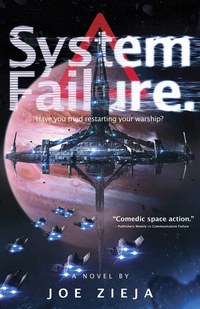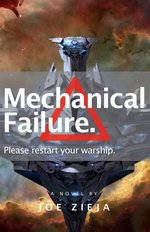 |
System Failureby Joe Zieja Paperback, 417 pg. Read: October 1-2, 2019 |

“You are literally placing the fate of the galaxy in my hands.” [Rogers] thought for a moment. “Again. You need to stop doing this.”
Every author closing out a series—a trilogy or something longer running—has a daunting task (not that stand-alones or duology’s aren’t daunting themselves, but it seems easier to me). They have to tell a self-contained story; weaving in the character and story arcs that have been percolating since the first book; resolve the new and old arcs; leave the characters in a place that readers will find satisfying; and provide some sort of ending to all of that to leave everyone in a place where you can move onto the next thing. For writers like Joe Zieja there’s an additional challenge—you have to make the whole thing funny.
Thankfully, Zieja does all of that very, very well.
Rogers’ fleet (including the Thelicosans) arrive at the home base for the Free Systems to meet with their High Command. Fully aware that the only military commander that’s had any kind of success with this new enemy is Captain Rogers, he’s named the head of the Joint Force tasked with preventing Snaggardirs from destroying the galaxy.
They also realize that the only way Rogers has had any kind of success is by throwing out all the rule books—including The Art of War II: Now In Space by Sun Tzu Jr. So they tell him to do just that. They don’t care how ridiculous or uneducated his plans are, as long as they get the job done. Snaggardirs has given the Free Systems a very limited time to acquiesce or face the destruction of the galaxy. And they seem to be able to pull that off.
So with help from a very unexpected source, Rogers reaches out to the same space pirates we haven’t seen since the disastrous opening to Mechanical Failure and also is forced to accept help from a Thelicosan practitioner of something that’s a combination of horoscopes and astrophysics (you’ll have to read the book to understand it). These, um, unconventional tools are added to the rag-tag bunch that has come to help Rogers in a last-ditch effort to save reality as we know it.
As usual, Rogers is the focus. He’s been on a journey of personal growth since we first met him—despite his best intentions, it should be stressed. He really comes a long way just in these pages and it’s pretty cool to see.
Of course, I can’t go without talking about Deet—the droid that Rogers assembled from junk. He’s also on a journey of personal growth—just a different kind. In addition to trying to understand how to justify and explain his existence, he’s trying to learn to empathize, as well as lie convincingly (or at all), and he continues to improve his [EXPLETIVE] swearing. He does get better at it and made me laugh out loud several times (both in his successes and failures). There was one misstep that he made, and I re-read that sentence a few times to figure out what he may be trying to say. Naturally, after I gave up and moved on, I learned that no one understood what he was going for.
I should add a little something about Tunger. I found him amusing in Mechanical Failure, but I thought he was overused (and became a little annoying). In Communication Failure, I stopped finding him all that entertaining, mostly trying. Which is how he started in System Failure. But he soon became a very cool character and one of the real strengths of the book. He really might be the best thing that Zieja did throughout the series.
It seems like a bonus to me—not at all the kind of thing one expects from a book like this—we’re given an antagonist that the reader can almost sympathize with. Yes, their methods and strategies are wrong and harmful to innocents. But you can’t help but understand why a people would set off in this direction. I can’t imagine anyone reading about their plight will start hoping for a failure for Rogers and the rest, don’t get me wrong. But you just might see where the Jupiterians are coming from.
There’s a key acronym in the book that a. is fitting, b. is funny, c. took me far too long to get. Once I stopped feeling stupid, I realized it was a great example of this being one of those books where even if you don’t get the jokes, the book holds up as a story well enough that you won’t even notice there are jokes you don’t get until later.
There’s one figure with access to the top of Snaggardirs who isn’t on board with their destroying the galaxy plan. So they set out to sabotage it by helping Rogers. Their scheme was pretty clever, but with one giant flaw. Which made their sacrifice sad—and their attempts at success very funny. It’s a good mix for the reader (a pathetic one for the character).
I’m not sure it’s entirely fair (and I don’t mean to disparage any of the books I’m about to mention in any way), but while reading this, I couldn’t help but compare this to two other humorous series and their conclusions. I hate to compare any comedic SF to The Hitchhiker’s Trilogy, but how do you not? This series never got as funny as the best of Hitchhiker’s (maybe a couple of times it got pretty close, though), but it was a cohesive and believable story, populated with better characters and a solid ending — unlike Adams repeated attempts at a conclusion that never really felt satisfying. Similarly, Epic Failure trilogy went out strong, with its strongest material still working, unlike The Tales of Pell which went a little off-course in the final volume and didn’t stick the landing the way that System Failure managed to do.
Zieja successfully called back to elements of the first book (some I’d forgotten about, some I thought had fully served their purpose) and built on the developments of the second to give this volume a bit more heft and greater stakes. Then he added a great story new to this novel and wrapped up everything in a satisfying and definitive way. All while making me chortle, chuckle, grin and occasionally laugh. Who can ask for [EXPLETIVE] more? I don’t know what Zieja has planned next, but sign me up for whatever it is.







